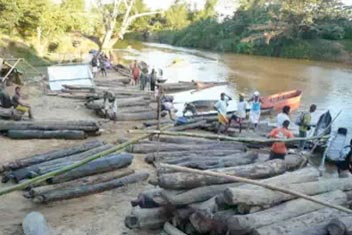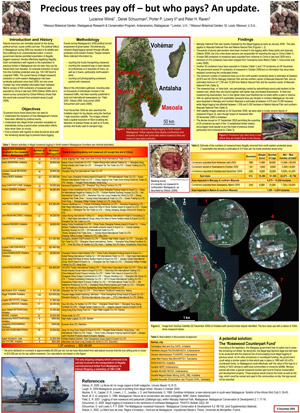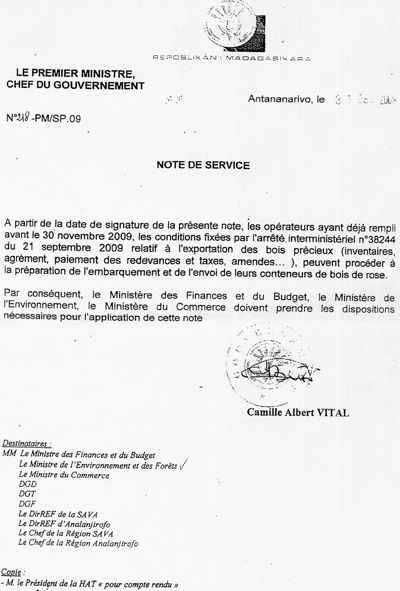| Updates / Comments |
Madagascar’s interim government may sell out its forests.
Facing a severe cash crunch in the aftermath of a March military coup which triggered donor governments to suspend aid and crippled its economy, Madagascar’s top politicians are reportedly mulling the export of tens of millions of dollars’ worth of precious hardwoods illegally logged from the country’s rainforest parks, according to high-placed sources in the Indian Ocean island nation.
Just two weeks after a $40 million dollar shipment of rosewood was canceled following international outcry, sources report that representatives from Madagascar’s interim president Andry Rajoelina’s government may be pressuring Delmas, a French shipping company that would have handled the December 22nd shipment, to begin picking up tens of millions of dollars worth of rosewood stored in containers in the port of Vohemar. Christian Claude Bezokiny, the owner of the Hôtel Hazavola in Antalaha and also a rosewood trader, said Wednesday that Rajoelina has cleared him to export 115 containers. Bezokiny has already exported more than $10 million worth of rosewood over the past year, despite restrictions on logging. Jeannot Ranjanoro, who may be Madagascar’s largest rosewood trafficker according to a report released last year, is apparently also preparing shipments. Ranjanoro is said to export rosewood under Flavour Handling LLC, a corporation based in Delaware. As a U.S. company, if Flavour Handling is shown to be involved in timber trafficking that violates Madagascar’s environmental laws, it could be potentially exposed to prosecution under the Lacey Act. Flavour Handling did not immediately respond to a request for comment.
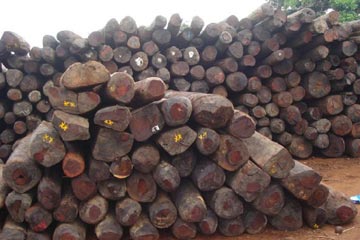 Rosewood logs.
|
Until the cancellation of the December 22nd shipment, Delmas had been the most prominent shipping company involved in rosewood trafficking, which surged amid Madagascar’s political crisis. A representative from the company said last week that it was no longer transporting rosewood, but there are indications its position may change.
“Delmas appears to be under pressure in Madagascar,” said a source who spoke on the condition of anonymity. “Someone is threatening them that if they do not export the rosewood then they can forget about exporting anything else from Madagascar.”
“Delmas is the only shipping company able to load up the required number of containers in Vohemar port – the other companies don’t have enough empty containers there.”
Resumption of the rosewood trade could be a windfall for traders — rosewood is one of the few sources of foreign exchange at the moment in Madagascar, where banks — especially in the north — are reported to be having difficulty facilitating large cash transactions. With elections approaching, rosewood may also be seen by politicians as a means to fund campaigns, according to another observer.
But while traders and politicians may benefit from lifting of the export ban on rosewood, its unclear whether most Malagasy (as the people of Madagascar are known) would see the upside. Logging has taken a heavy toll in some of Madagascar’s most spectacular parks, which are the basis for the 390-million-a-year tourism industry. Further, logging has been associated with a rise in commercial bushmeat hunting of birds and endangered lemurs, chief draws for tourists. Therefore expanded logging could well have long-term ecological impacts on the country’s most biodiverse forests, thereby undermining ecotourism for years to come.
So what can be done? One observer is calling for an embargo on rosewood and pressure on the Rajoelina regime and French government, which has ostensibly supported an E.U. policy to crack down on illegal logging (FLEGT) and a U.N. initiative to reduce deforestation (REDD).
“We all know that Madagascar needs money, but we also know that the rosewood money won’t benefit the poor, won’t save lives and will only enrich the logging syndicate,” the source said. “The embargo is certainly the best thing we can do. We also need to question the French government on its involvement in the affair since it provides political and financial support to Rajoelina’s transitional authority.”
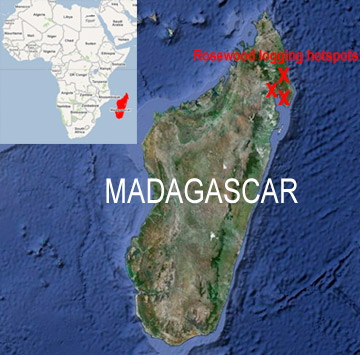
|
Rajoelina is in a difficult position. He is viewed by most of the world as an illegitimate leader. Consequently most donor countries have suspended aid, which accounts for roughly 50 percent of the government’s budget. So perhaps it is not surprising that his administration has turned to rosewood as a source of foreign exchange. Nevertheless exploiting rosewood isn’t a long-term solution to Madagascar’s ills. Madagascar needs good governance, something that at this point will only come through political compromise that leads to resumption in foreign aid until the country is back on its feet.
MADAGASCAR RAINFOREST MASSACRE
Related articles
Madagascar’s Political Chaos Threatens Conservation Gains [Yale e360]

(01/04/2010) Only ten years ago, Madagascar was notorious for its environmental degradation and deforestation; astronauts orbiting the earth remarked that the red color of Madagascar’s rivers suggested the country was bleeding to death as its denuded mountainsides hemorrhaged topsoil into its waterways. But that began to change earlier this decade when President Mark Ravalomanana, working with international conservation organizations and local groups, set aside 10 percent of the country as parks and nurtured a thriving ecotourism business, all of which slowed deforestation and safeguarded more of the nation’s legendary biodiversity. The emergence of ecotourism helped make local people partners — rather than adversaries — in conservation. In short order, Madagascar went from being a pariah of the conservation world to a model. All of which makes the spasm of forest destruction that has swept the country since a coup last March even more tragic. In the absence of governance, organized gangs ransacked the island’s protected rainforests for biological treasures — including precious hardwoods and endangered lemurs — and frightened away tourists, who provide a critical economic incentive for conservation.
(12/17/2009) Delmas, a subsidiary of French shipping giant CMA-CGM, is facilitating the destruction of Madagascar’s endangered rainforests by providing transport for timber illegally logged from the country’s national parks, report multiple sources that have been investigating the illegal rosewood trade in the Indian Ocean island nation. The accusations put Delmas directly in conflict with the French government’s push at climate talks in Copenhagen to establish stronger safeguards against illegal logging.

(12/16/2009) In the midst of cyclone season, a ‘dead’ period for tourism to Madagascar’s east coast, Vohémar, a sleepy town dominated by the vanilla trade, is abuzz. Vanilla prices have scarcely been lower, but the hotels are full and the port is busy. “This afternoon, it was like a 4 wheel drive show in front of the Direction Regionale des Eaux & Forets,” one source wrote in an email on November 29th: “Many new 4×4, latest model, new plane at the airport, Chinese everywhere.”



